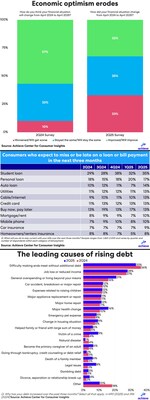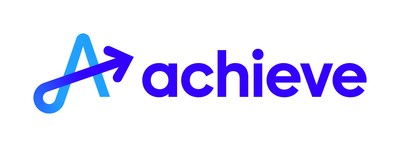Economic optimism fades as households continue to struggle under mounting debt and tight budgets.
SAN MATEO, Calif., May 13, 2025 /PRNewswire/ — A new survey by digital personal finance company Achieve reveals a gap between consumers’ financial expectations and their economic reality. While 57% of respondents believed their finances were poised for improvement over the past year, only 32% of American households actually realized those expected gains.

This reversal of fortunes underscores the fragility of household budgets as broad cost pressures from inflation, high interest rates and now, tariffs, push more consumers into relying on debt to make ends meet. Achieve’s April 2025 survey found 33% of consumers said their financial situation deteriorated over the past year — a stark contrast from the 10% who predicted a decline in Achieve’s inaugural survey in spring 2024.
“Households enter 2025 more pessimistic and with fewer financial gains in hand than most were expecting,” said Achieve Co‑Founder and Co‑CEO Brad Stroh. “The optimism gap is a warning sign that highlights the need for tools and strategies that address the financial strain facing households. The reality of high debt loads, high interest costs and persistent inflation cast a sustained shadow on the financial optimism for many Americans.”
|
Economic optimism erodes |
|||
|
Worsened/Will get worse |
Stayed the same/Will stay the same |
Improved/Will improve |
|
|
How do you think your financial situation will change from April 2024 to April 2025? (2Q24 Survey) |
10 % |
33 % |
57 % |
|
How did your financial situation change from April 2024 to April 2025? (2Q25 Survey) |
33 % |
35 % |
32 % |
|
Source: Achieve Center for Consumer Insights |
|||
The survey, conducted by Achieve’s think tank, the Achieve Center for Consumer Insights, complements the Federal Reserve Bank of New York’s Quarterly Report on Household Debt and Credit by providing qualitative insights into consumer borrowing and debt. The latest edition of Achieve’s study highlights some of the risks that persistent reliance on debt poses for many consumers:
- 25% of respondents accrued more debt over the past three months, nearly level from Achieve’s first quarter 2025 study. Meanwhile, 40% said their total debt remained flat and 35% decreased their debt (approximately level from last quarter).
- 58% of those surveyed use credit card debt to cover essential expenses. Two out of every five of these respondents have had this debt for more than six months.
- 37% say it’s difficult to pay their debts on time, up slightly from 36% last quarter.
- 59% report paying all of their bills on time, down from 65% during 1Q25 and 61% in 2Q24, the inaugural edition of Achieve’s study.
Missed Payment Risk Rises
Consumers are increasingly at risk of being late or missing debt and monthly bill payments, Achieve’s survey found. Consumers reported a higher risk of missing a payment in the next three months on nearly all of the monthly obligations covered in the survey. In 2Q25, missed payment risk on student loans increased to 35% (up from 32% last quarter), while even secured debts like auto loans (14%) and mortgages (10%) are at greater risk of a late or missed payment, the survey found.
|
Consumers who expect to miss or be late on a loan or bill payment in the next three months |
|||||
|
Debt Type |
2Q24 |
3Q24 |
4Q24 |
1Q25 |
2Q25 |
|
Student loan |
29 % |
28 % |
38 % |
32 % |
35 % |
|
Personal loan |
18 % |
15 % |
18 % |
20 % |
17 % |
|
Auto loan |
10 % |
12 % |
11 % |
7 % |
14 % |
|
Utilities |
11 % |
12 % |
12 % |
11 % |
13 % |
|
Cable/internet |
9 % |
10 % |
11 % |
10 % |
13 % |
|
Credit card |
11 % |
13 % |
12 % |
13 % |
13 % |
|
Buy now, pay later |
13 % |
19 % |
13 % |
17 % |
13 % |
|
Mortgage/rent |
8 % |
9 % |
9 % |
7 % |
10 % |
|
Mobile phone |
7 % |
9 % |
10 % |
8 % |
10 % |
|
Car insurance |
7 % |
7 % |
7 % |
7 % |
9 % |
|
Homeowners/renters insurance |
8 % |
8 % |
7 % |
5 % |
8 % |
|
Q: What will you do to stay current with your bills over the next three months? Sample ranges from 1,460-2,000 and varies by quarter and number of respondents within each category of bill payment. Source: Achieve Center for Consumer Insights |
|||||
“When people are squeezed by debt levels and ongoing bills, their stress level rises,” Stroh said. “Our data shows that even small income disruptions or timing mismatches can lead to late payments and these challenges are magnified by higher borrowing costs that make it more costly to carry debt balances.”
Drivers of Rising Debt
Among respondents whose debt increased over the past three months, one in three (33%) pointed to difficulty making ends meet without borrowing, 28% cited employment and income challenges and 21% acknowledged falling victim to general overspending. Healthcare costs and other medical issues remain a key challenge, with 16% of respondents attributing their debt to these expenses.
|
The leading causes of rising debt |
||
|
2Q24 |
2Q25 |
|
|
Difficulty making ends meet without additional debt |
36 % |
33 % |
|
Job loss or reduced income |
27 % |
28 % |
|
General overspending or living beyond your means |
16 % |
21 % |
|
Major health change |
10 % |
16 % |
|
Car accident, breakdown or major repair |
12 % |
12 % |
|
Expenses related to raising children |
12 % |
12 % |
|
Major home repair |
11 % |
12 % |
|
Major appliance replacement or repair |
11 % |
11 % |
|
Victim of a crime |
4 % |
9 % |
|
Change in housing situation |
8 % |
9 % |
|
Emergency pet expense |
8 % |
8 % |
|
Legal issues |
3 % |
8 % |
|
Became the primary caregiver of an adult |
4 % |
6 % |
|
Helped family or friend with large sum of money |
5 % |
6 % |
|
Death of a family member |
3 % |
6 % |
|
Divorce, separation or relationship break-up |
2 % |
4 % |
|
Gambling debt |
2 % |
3 % |
|
Going through bankruptcy, credit counseling or debt relief |
3 % |
2 % |
|
Natural disaster |
4 % |
1 % |
|
Other |
18 % |
10 % |
|
Q: Why has your debt increased over the past three months? Select all that apply. n=490 (2Q25) and 396 (2Q24) Source: Achieve Center for Consumer Insights |
||
Methodology
The data and findings presented are based on an Achieve survey conducted in January 2025 consisting of 2,000 U.S. consumers ages 18 and older with an active account for one or more of the following categories of consumer debt: auto loan; major credit card with a minimum outstanding balance of $100; first-lien mortgage; home equity line of credit (HELOC); student loan; and other (unsecured personal loan, store-branded credit card, buy now, pay later loan, or closed-end home equity loan). The sample was augmented to include a statistically significant subset of credit card, auto loan and student loan borrowers who have been 30 days or more past due at least once in the past six months.
About the Achieve Center for Consumer Insights
The Achieve Center for Consumer Insights is a think tank that leverages Achieve’s team of digital personal finance experts to provide a view into the state of consumer finances. In addition to sharing insights gleaned from Achieve’s proprietary data and analytics, the Achieve Center for Consumer Insights publishes in-depth research, bespoke data and thoughtful commentary in support of Achieve’s mission of helping everyday people get on the path to a better financial future.
About Achieve
Achieve, THE digital personal finance company, helps everyday people get on, and stay on, the path to a better financial future. Achieve pairs proprietary data and analytics with personalized support to offer personal loans, home equity loans, debt resolution and debt consolidation, along with financial tips and education and free mobile apps: Achieve MoLO® (Money Left Over) and Achieve GOOD (Get Out Of Debt). Achieve has 2,300 dedicated teammates across the country, with hubs in Arizona, California, Florida and Texas. Achieve is frequently recognized as a Best Place to Work.
(Get Out Of Debt). Achieve has 2,300 dedicated teammates across the country, with hubs in Arizona, California, Florida and Texas. Achieve is frequently recognized as a Best Place to Work.
Achieve refers to the global organization and may denote one or more affiliates of Achieve Company, including Achieve.com, Equal Housing Opportunity (NMLS ID #138464); Achieve Home Loans, Equal Housing Opportunity (NMLS ID #1810501); Achieve Personal Loans (NMLS ID #227977); Achieve Resolution (NMLS ID # 1248929); and Freedom Financial Asset Management (CRD #170229). Personal loans are originated by Cross River Bank, a New Jersey State Chartered Commercial Bank, Equal Housing Lender.
Contacts
Austin Kilgore
Director
Corporate Communications
[email protected]
214-908-5097
Elina Tarkazikis
Manager
Corporate Communications
[email protected]

![]() View original content to download multimedia:https://www.prnewswire.com/news-releases/consumer-confidence-falters-as-financial-expectations-fall-flat-achieve-survey-finds-302454150.html
View original content to download multimedia:https://www.prnewswire.com/news-releases/consumer-confidence-falters-as-financial-expectations-fall-flat-achieve-survey-finds-302454150.html
SOURCE Achieve

The post Consumer confidence falters as financial expectations fall flat, Achieve survey finds appeared first on The Malaysian Reserve.
